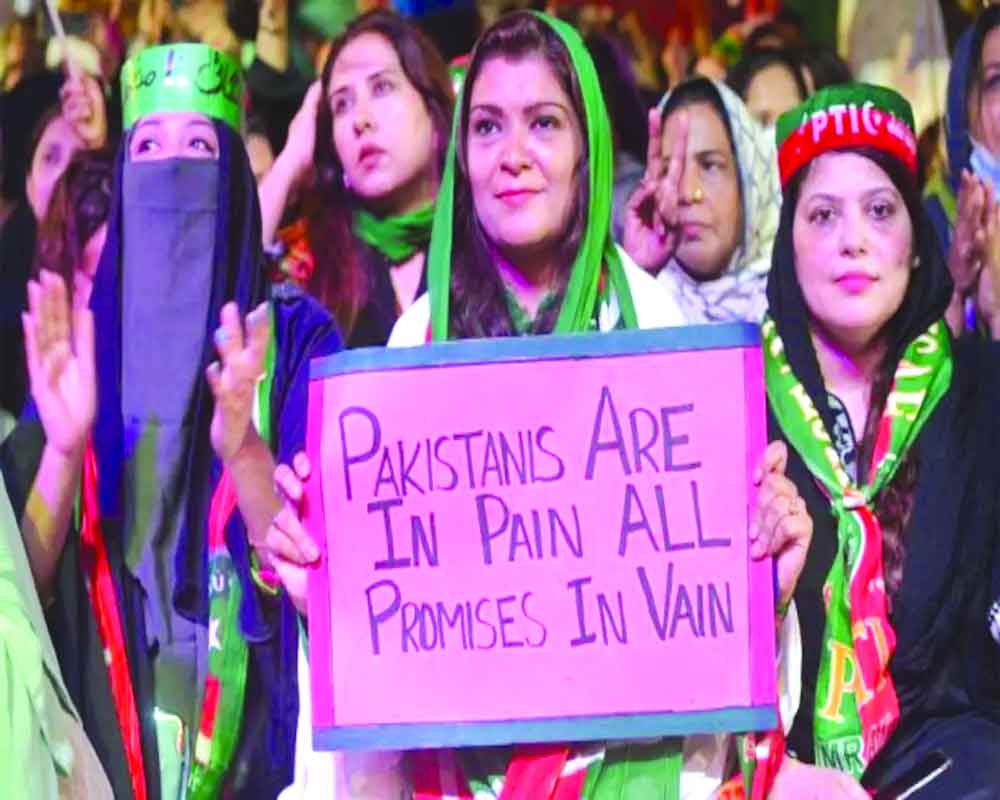Pakistan is as unstable as it was at the time of its independence. Its political class is largely to blame for its present state
Pakistan at 75 is at its chaotic best. It is at war with itself, deeper into political and economic holes. Writing in The Dawn on 14 August 2022, Mahir Ali said: “prompt and drastic measures are necessary to save Pakistan from virtual bankruptcy but our rulers seem to be content with obtaining foreign gifts to feed people and relying on heavier doses of foreign aid for maintaining some semblance of economic development”. This Ali quotation is taken from a Pakistan Times editorial of 14 August 1958. Pakistan's many worries could go Sri Lanka's way, an issue that has been debated in the last few months. For the first time, its Army Chief, Gen Qamar Bajwa had to send an SOS to US State Department and traditional donors Saudi Arabia and UAE. Where China figures in this firefighting is unclear but it recently indicated that Beijing’s relations with Rawalpindi are a lynchpin of Pakistan-China ties. On his last visit to Islamabad Foreign Minister Wang Yi especially traveled to Rawalpindi to meet Gen Bajwa. Chinese military spokesperson noted: “China and Pakistan are all-weather strategic partners, true friends and iron brothers that share weal and woe”. After 1998, Pakistan acquired nuclear weapons. No one wants a nuclear Somalia is a common refrain.
Pakistan approached IMF in May for the 18th time in its short history. The current account deficit has increased from USD600bn in 2017 to USD3500bn in 2021; the Pakistani rupee is at its lowest ever against the USD at Pakistan Rs 240 with imports severely restricted and oil prices shooting up. Saudi Arabia has transferred USD 4bn including the amount for oil financing and rolled over an existing debt of USD4bn. Equally worrying is political instability, one of the reasons for economic turmoil. The PML-N-led coalition under Shahbaz Sharif which unseated Imran Khan in April in a no-confidence motion is on a sticky wicket after its political stronghold Punjab fell to Imran Khan’s PTI.
The Election Commission of Pakistan on 2 August ruled that PTI accepted prohibited funds from various sources including Arif Naqvi, a philanthropist living in Dubai. The Supreme Court will adjudicate and this could lead to a ban on the PTI. The timing of the ECP order is interesting as a funding case is also pending against PML N. Voters concerned with livelihood issues blame PML N for their grief. PML N will hobble PTI so it cannot function. Gen Bajwa’s replacement is to be found in September before he steps down in November. The new Army Chief may decide on early elections.
75 years on, civil-military relations have institutionalized the role of the Army as the ultimate custodian of internal and external challenges. In Pakistan, the Army and bureaucracy became the primary institution of governance due to a weak Muslim League.
Directly or indirectly, the military has ruled Pakistan with a democratic façade aided by the judiciary. Khan’s attempt to interfere with the Army’s internal affairs cost him his job. His Chief of Staff, Shehbaz Gill is in jail for urging the military not to obey illegal orders. Khan also burnt his fingers at the US, blaming it for the fall of his government.
The many lows and one high of India-Pakistan relations need repeating. The lows resulted in wars. The one high was between 2003-07, ironically after the terror attack on Parliament. Back channel talks between Satinder Lambah and Tariq Aziz paved the way for the resolution of Kashmir. This, of course, did not happen. Prime Minister Modi tried to mend fences with Pakistan but soon his patience was overtaken by muscular impulses. The door to formal dialogue is shut since the 2000 beheading of Indian soldiers. A brief effort was made by the government to restart dialogue failed because of the unrealistic condition that talks and terror will not go together.
Further the reading down of Article 370 has made talks a distant dream. But the problem of Kashmir cannot be wished away. Kashmir figures periodically in the UNSC, is texted in the Simla and Lahore Agreements, and China has made itself a third party to the dispute. It took preemptive measures for the security of Aksai Chin following Home Minister Shah’s threat to retake it. India now has a second live front.
Neutralising the Pakistan front politically and diplomatically is vital. Former High Commissioner to Pakistan, Sharat Sabharwal in his book India-Pakistan Conundrum: Managing a Complex Relationship says: “India’s Pakistan policy born out of anger and false notions of national honour, caused more harm than good”. If India sets its own house in order including J&K, Pakistan will not be able to fish in troubled waters, he adds. Mahir Ali’s story last week carried this headline: “Pakistan has learnt little from India while India has taken the worst lessons from Pakistan”.
(The writer, a retired Lt Gen, was Commander, IPKF South, Sri Lanka, and founder member of the Defence Planning Staff, currently the Integrated Defence Staff. The views expressed are personal.)


























